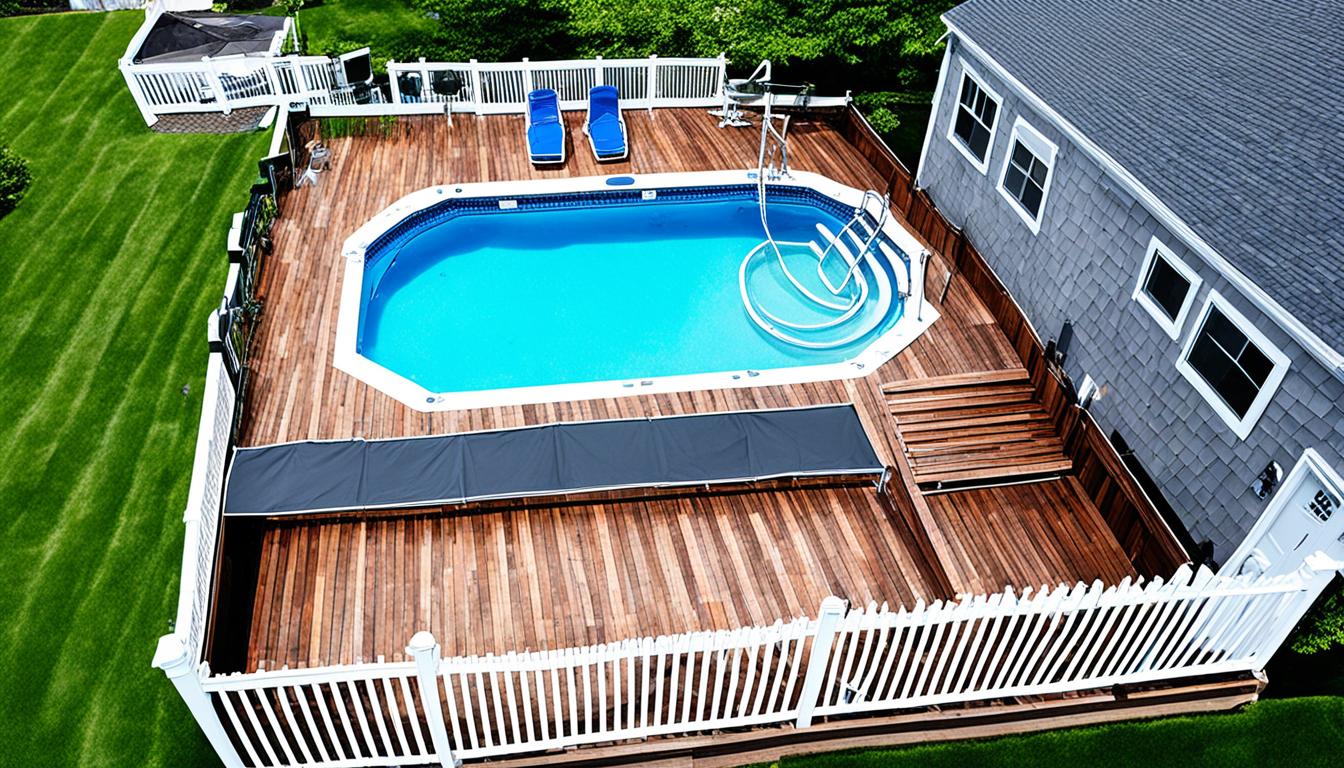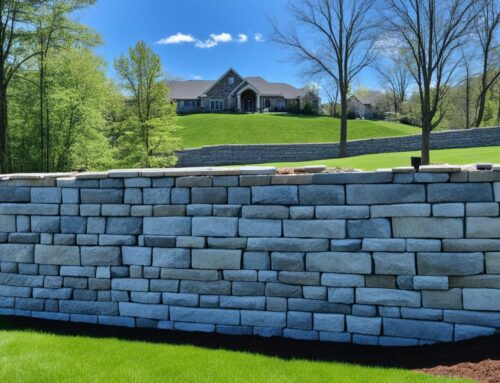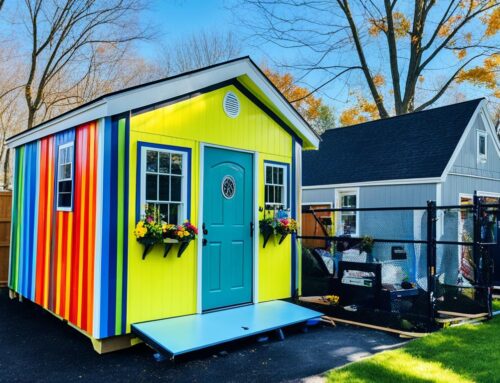Did you know that over 117,000 individuals have looked into getting above-ground pool permits on Long Island? This shows the high importance of understanding swimming pool permits for homeowners. Many people talk about these permits online, showing that they care a lot about compliance and safety.
If you’re planning to add an above-ground pool to your Long Island home, knowing the rules is key. Whether you live in Nassau County or Suffolk County, the rules can vary. Tracis Permits can help. They’ve helped people for years to get the approvals they need, following local building and zoning laws.
The details, like pool barriers and how far the pool needs to be from other things, are important. For example, users like hotkarl have asked if permits are necessary. Others, like scottzilla, say they are. In places like Brookhaven, the rules are very detailed. With Tracis Permits, you get the right help to make getting permits easier. They ensure your project follows all local guidelines.
Key Takeaways
- Understanding local guidelines is critical for obtaining above-ground pool permits on Long Island.
- Forums and user posts indicate a high level of interest and concern regarding permit compliance.
- Tracis Permits offers expert services to navigate local building codes and zoning regulations.
- Every town, such as Brookhaven, may have specific and unique regulations that need professional guidance.
- Compliance with safety regulations, like pool barriers and setback requirements, is crucial.
Understanding the Basic Requirements for Above-Ground Pools
Setting up an above-ground pool in Long Island needs careful planning. You need to follow building rules and make sure everything is legal. It’s important to know the size of the pool, where to place the equipment, and how far the pool should be from your property lines. This helps avoid breaking any laws and ensures a safe swim.
Pool Dimensions and Location
Choosing the right pool size and place is key. In New York, you need a permit for pools over 24 inches deep or holding more than 5,000 gallons. They also need to be put in the right spot on your property. This follows local zoning laws and keeps a good distance from neighbors.
Mechanical Equipment Placement
Where you put equipment like pumps and filters matters a lot. They should be far enough from the pool to cut down on noise. Yet, they must meet New York’s building codes. Local rules may also say how far this equipment needs to be from your property lines to avoid bothering neighbors.
Rear and Side Yard Setbacks
Knowing setback rules is crucial for pool owners in Long Island. For example, Floral Park requires pools to be five feet from rear or side yard lines. These rules help keep everyone safe and make sure pools are easy to access and maintain. Always check with local authorities to make sure your pool meets these standards and avoids fines.
Compliance with Town Specific Regulations
Installing a pool above ground on Long Island means you must follow town rules. Each town has its own rules about fences, where you can put the pool, and getting a permit. It’s very important to know these rules in places like the Town of North Hempound and Brookhaven Town for an easy installation.
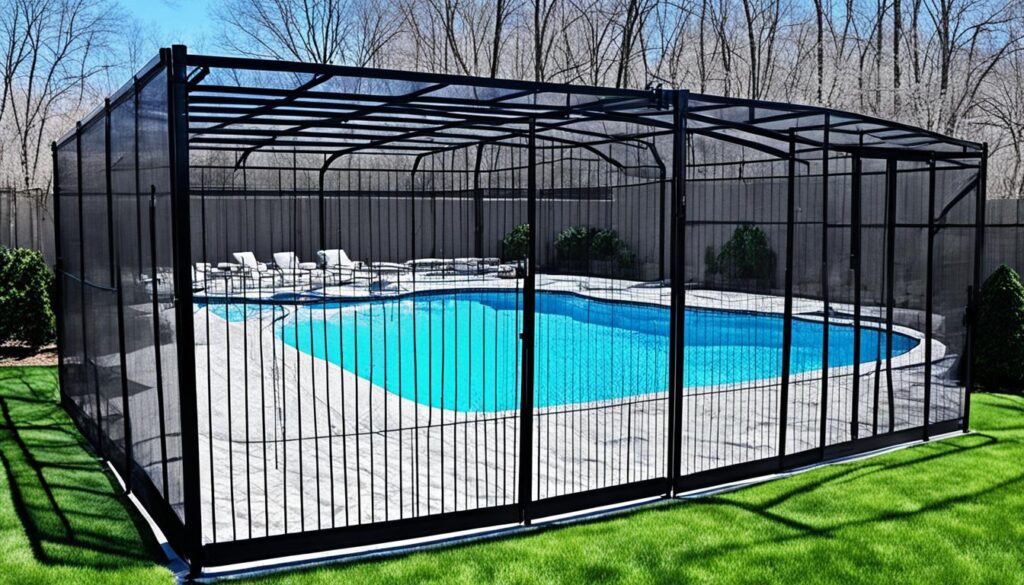
Town of North Hempstead Requirements
In the Town of North Hempstead, you need a detailed plan for your pool. This plan must show where the pool and its equipment will go, following specific rules. It must also meet the 2020 RCNYS and 2020 BCNYS, requiring fences at least 48 inches tall, according to Section R326.4.2.9. Plus, while putting in your pool, a temporary fence is needed as stated in Section R326.4.1.
Brookhaven Town Guidelines
In Brookhaven Town, the rules are a little different. Above-ground pools usually don’t need a permit unless partly buried. However, they must meet the ANSI/APSP/ICC 4, 2012 standards for pools. Also, pools must be kept clean and safe as per New York’s maintenance code. This includes fences, alarms, and safety features.
Other Local Municipalities
Other towns on Long Island also have their own rules about above-ground pools. Safety features like fences are very important. In some areas, fences and pool barriers must be at least 4 feet tall. They also have rules about how far your pool must be from other structures.
Knowing and following these town rules helps keep your pool safe and legal. Talking to local officials or contractors can help you understand these rules better.
Site Plan and Survey Essentials
A well-prepared site plan and accurate survey are key for a pool permit in Long Island. They make sure your pool follows local rules and zoning laws. This part will show you what you need for a good site plan and survey. Being ready helps meet permit rules and makes getting a building permit easier.
Site Plan Specifications
The site plan needs to show exactly where the pool will go. It must include the pool’s size and how it sits next to your house and edges of your property. Keeping pools and their equipment in the rear yard is a must. This plan checks that your pool installation meets the required distance from property lines, following Long Island’s town and city rules.
- Accurate pool dimensions and placement
- Location of mechanical equipment
- Illustration of property lines and setback distances
- Inclusion of any additional structures like decks or patios
If your site plan is complicated, you might need a New York State licensed design professional. They can make sure your plan meets all design and safety standards.
Survey Requirements
Doing a detailed survey is just as important. It checks the property lines and ensures everything is built the right distance away from them. Your project’s needs will dictate the type of survey required:
| Type of Survey | Cost Range |
|---|---|
| Boundary Survey | $100 – $600 |
| Topographic Survey | $500 – $1,200 |
| ALTA Survey | $2,000 – $3,000 |
HomeAdvisor says the average cost for a land survey is about $504. For pool installation, lenders or title companies might want a survey too. It helps manage risks like encroachments and boundary issues.
Making sure your site plan and survey meet all permit requirements is crucial. The right paperwork avoids delays and legal problems later. It ensures your pool installation is done right and follows the law.
Pool Barrier and Fencing Guidelines
In Long Island, keeping above-ground pools safe involves strict pool barrier and fencing guidelines. These rules are part of important safety regulations. They help prevent accidents and stop people from getting into the pool area without permission.
Pool Barrier Heights and Dimensions
Building codes require a barrier at least 4 feet high around outdoor pools. This fence must fully enclose the pool. It can be on the ground or on top of the pool structure. But, there must not be a big gap between the pool and the fence.
For pools set up or changed after December 14, 2006, there must be an approved alarm. This alarm will go off if a child falls into the water.
Fence Permit Application
You need a fence permit for building or fixing pool barriers. This is according to the Uniform Fire Prevention and Building Code. The fence must meet specific size and material rules. It must also not break local safety and zoning rules. You must renew the permit every year to keep using the fence.
Gate and Alarm Requirements
Gates to the pool must close and latch by themselves and swing out. Doors or windows leading to the pool need special alarms and locks. These rules are strict to keep kids and others from getting into the pool area alone.
The US Consumer Product Safety Commission gives advice on following these safety steps.
| Requirement | Details |
|---|---|
| Barrier Height | Minimum 4 feet (48 inches) |
| Barrier Placement | Ground level or on top of pool structure, with limited gap |
| Pool Alarm | Mandatory for pools installed after Dec 14, 2006, to detect child entry |
| Gate Specifications | Self-closing, self-latching, and outward swinging |
| Alarm Compliance | UL 2017 compliant alarms for doors/windows opening into the pool area |
| Fence Permit | Required for construction and maintenance, annual renewal necessary |
By following these clear pool barrier and fencing rules, homeowners make their pools safe. This keeps them in line with local codes and safety rules.you follow these rules, you help to prevent accidents and unauthorized access to your pool.>
Above-Ground Pool Permit Long Island: The Permit Process
Getting an Above-Ground Pool Permit in Long Island is detailed. It involves several steps to meet safety and legal rules. Here, we’ll outline the key parts of the permit process, from applying to getting the final OK.
Application Submission
The first step is applying for the permit. Here’s what you need to hand in:
- Two filled-out Outdoor Water Pool Permit Application (87-02) forms
- Two recent, complete survey copies
- Two Swimming Pool Affidavit (87-03) forms, signed and notarized by the owner
- Fee payment, which you can do in person or by phone with a credit card
You also must place pool equipment at least five feet from the property line.
Review and Approval Stages
After you submit your application, it enters the review phase. Officials check if your plan follows local rules. This review can take a few days to two weeks. It depends on how complex your project is and if you need to provide more info. Permit fees are about 1.2% of your total project cost for big projects. People applying for homes usually get their permits faster than businesses.
Final Inspection and Certification
After getting the green light, your pool will be inspected. This is to make sure it was built as planned. Inspectors also check if it meets all safety rules. You’ll need a final Electrical Inspection Certificate. This proves all electrical parts are set up right. At the end, you get a Certificate of Completion. This means your project is officially done and your pool is ready to enjoy.
| Stage | Timeframe | Key Requirements |
|---|---|---|
| Application Submission | Immediate | Completed forms, survey copies, notarized affidavits, fee payment |
| Review Stages | 2 days to 2 weeks | Adherence to codes, possible additional documents |
| Final Inspection | Upon project completion | Verification of approved plans, Electrical Inspection Certificate |
| Certification | Post-inspection | Issuance of the Certificate of Completion |
Following these steps makes sure your above-ground pool permit process in Long Island goes smoothly.
Additional Safety and Compliance Measures
Making sure pools in Long Island follow the 2021 New York State Residential Code is key. For better safety, installing pool alarms helps prevent accidents. Also, entrapment protection is needed to stop swimmers from getting trapped by pool drains.
Keeping pools clean all year is a must. Checking and fixing fences, pool alarms, and entrapment protection gear is part of it. By sticking to ANSI/APSP/ICC standards, pools remain safe, cutting down on dangers.
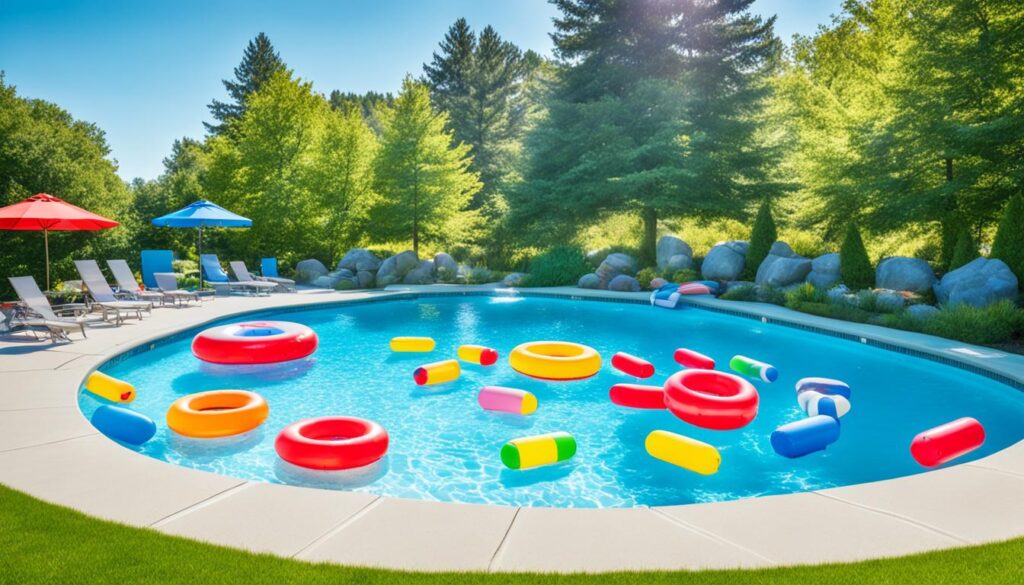
| Inspection Task | Frequency (%) |
|---|---|
| Clearance checks for electric utility lines | 85% |
| Site visits for NESC and Town Codes compliance | 60% |
| Marking out pool/hot tub location | 70% |
| Instances of electric utility wires in backyard | 45% |
| Pool/hot tub installations with dogs present | 25% |
In NYC, some minor works don’t need special permits. Things like simple plumbing fixes and small repairs are examples. But, installing small pools that fit certain size rules is okay without a permit, except when it’s more than just maintenance. Then, you need a Licensed Master Plumber.
For above-ground pools, having fences that meet strict rules is super important for safety. They have to be tall enough and spaced right to keep people out. Local rules also say how far your pool should be from your house and the property line. Like in Floral Park, pools need to be five feet away from lot lines at least.
Working with Professionals for Permits
When planning a Long Island renovation, especially an above-ground pool, hiring licensed professionals is key. They understand building codes well and ensure everything follows the rules.
Importance of Hiring a Licensed Contractor
Choosing a licensed contractor is vital for your project. They have lots of experience, handle complex rules, and get the needed permits. Your project will be done well and meet all rules.
The Role of an Architect or Engineer
Working with an architect or an engineer is also crucial. They make detailed plans and check that everything follows local laws. They are super helpful for special situations, like big electrical jobs or when you want to change the structure.
Contacting Tracis Permits for Assistance
To get permits easily, reach out to Tracis Permits. They offer permit assistance for homeowners. Tracis Permits is great for Long Island projects. They help avoid problems and speed up the permit process.
Teaming up with these experts makes sure your project follows the rules. It also makes construction smoother, saves you time, and lowers stress.
Conclusion
Getting an Above-Ground Pool Permit on Long Island is key for owning a pool responsibly. You need to know the local rules well. This makes every step, from applying to passing final checks, smooth. It keeps your pool legal and safe for everyone.
Adding a pool at home boosts fun and your property’s value. It’s important to follow local laws, like getting permits and following building rules. This makes your property better and keeps everyone safe. Getting the right permits shows your pool meets safety and law standards.
In the end, getting the right permit for your pool ensures it’s safe and legal. This lets you enjoy your backyard paradise without worries. By being a responsible pool owner, you make it fun and safe for all. Careful planning and following rules make owning a pool a real joy.








